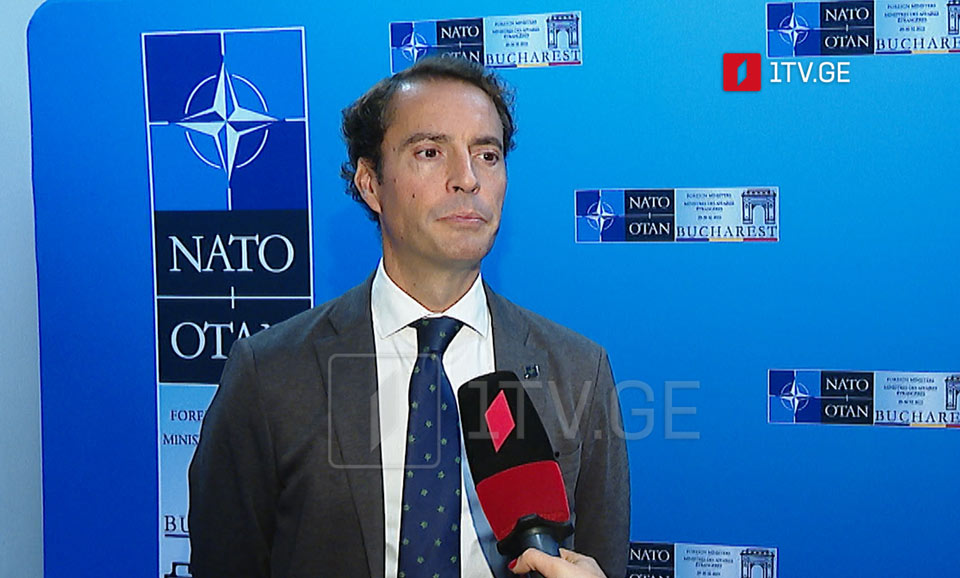
Javier Colomina, Deputy Assistant Secretary-General for Political Affairs and Security Policy and NATO Secretary General’s Special Representative for the Caucasus and Central Asia, set down in an interview with GPB First Channel in Bucharest, focusing on Georgia’s NATO integration prospects, reforms and the cooperation of the government and the opposition in this process.
Below is the full interview:
What message will Bucharest meeting participants send to Georgia, one of the countries in the Black Sea region?
Bucharest is a quite symbolic city for us. This is where we met in 2008. It is also symbolic for you and for Ukraine because we took important decisions in 2008. The decisions we have been standing by since that moment in every summit and the ministers have been very clear, reaffirming in their statements that, basically, the Black Sea, together with the Balkans, are the regions of strategic importance as the Caucasus is.
That is why we continue to work with Georgia in a very efficient way together with the armed forces, defence and foreign ministries, holding a political dialogue. Mr Darchiashvili is here. Only in 2022, we had Georgia in four different ministerial – defence and foreign affairs. We had Prime Minister Garibashvili in Madrid. I was myself at the Parliamentary Assembly in Madrid and had a meeting with the Georgian delegation. So, I think the political dialogue and practical cooperation with Georgia demonstrate the importance that Georgia has for us and the Black Sea has for NATO.
You noted that Bucharest has historical importance for Georgia since NATO determined 14 years ago that Georgia and Ukraine would be members of the alliance. The alliance, however, opted not to provide MAP to these nations. Georgia’s territorial integrity was soon breached. We are currently observing events in Ukraine. What can NATO now offer to Georgia?
As you know, the decisions are there. We have been standing by these decisions. It is for Georgia to work on the partnership tools, to get ready as much as possible to convince the allies to take a political decision to invite Georgia to access NATO. You have to do that.
What can NATO do? Together, we have to work on partnership tools and we have plenty of them. We have the Annual Action Plan and NATO Substantial Package, and now we have approved the Tailored Support Package that provides a platform for collective action, also for individual support for Georgia in different aspects.
At the same time, your country needs to work more efficiently on, in the sense of implementing the reforms that we have identified together with your experts and authorities. And those are very similar to the ones that the European Union has identified.
Twelve recommendations came from the EU, and 10 recommendations came from NATO in ANP and that is not a coincidence. It is basically the same substance. And as I’ve been saying very openly in the different visits that I had in Tbilisi, also in different contexts with your authorities in different places, at the Parliamentary Assembly and also when I met Prime Minister Garibashvili, being in Madrid or in Brussels. You need to regain the momentum and increase the level of implementation of those reforms in order to get ready for that political decision coming from the allies. But you will need to convince the allies.
My next question concerns reforms. What do you regard as progress or regress in that process? We’ve heard that NATO is dissatisfied with the pace at which reforms are being implemented.
Yes, we are not satisfied, and there is a concern. I will not use the word backsliding as some of the allies have been using it already. But I believe there is a concern. Political polarization within Georgia is a concern, a difficulty that the government and the opposition have to work together. It is a shared responsibility of the government and the opposition. That is why when I was in Tbilisi in September, I met the whole opposition to convey the message clearly.
We believe that the initiative when it comes to political polarization should come from the government because they lead the country, but the opposition also has the responsibility to respond positively to the message that could come from the government.
We have not seen many messages coming from the government yet. We encourage your authorities to go on that path, trying to breach those difficulties. I also talked to your President. It is a concern because, in the end, the level of the fulfilment of those reforms depends very much on the ability of the government and the opposition to cooperate together.
What will be your advice to the opposition, when the government says it is doing its best, but the opposition refuses to cooperate because it puts political and party interests above that of the country?
This is very much of domestic politics. You should deal with that. If I have to say something to both the government and the opposition, I would say that the Euro-Atlantic aspirations, both the European Union and NATO, should be over those political interests.
I know that the desire to become a member of the European Union and NATO is bipartisan. And when it comes to the reforms to be implemented in order to make the desire more likely, then you have problems between the government and the opposition.
As I told, in Tbilisi, both the authorities, the Prime Minister and the opposition, you need to try to overcome those differences and work together because it is, really, a goal that unites Georgia. It is what your citizens want, 72% support NATO accession. They need to overcome the differences. I know that it is difficult, but political games are difficult in every country. So, this will be my suggestion.







